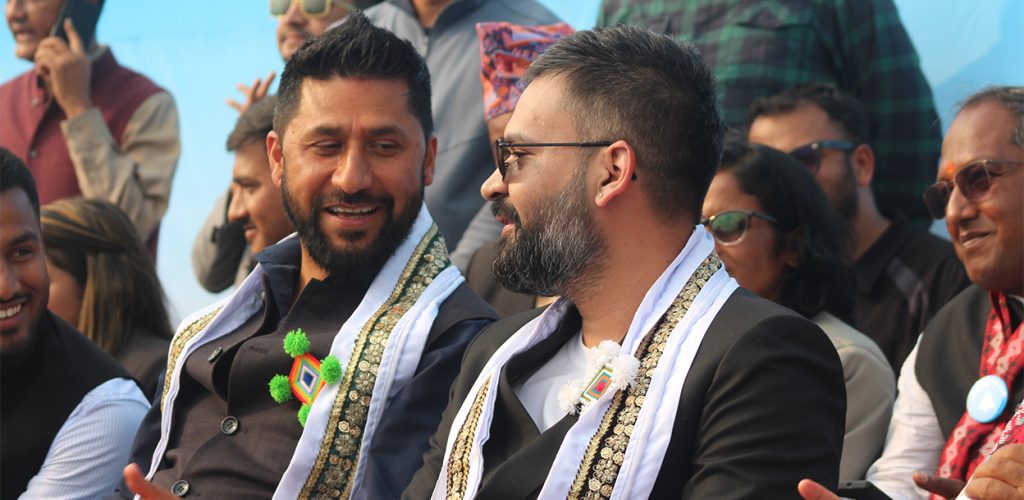
The operator of Routine of Nepal Banda (RONB), which is among the most widely followed social media pages in Nepal, has recently decided to close down its Facebook, X (formerly Twitter) and Instagram pages. Whether it is temporary or permanent, only time will tell but the reaction in the public sphere is evidence of how influential the page has been for Nepalis living both in Nepal and abroad.
RONB was created in 2011 for a specific purpose – disseminating news related to general strikes to the public so that everyone could manage their schedule accordingly. Back then, these strikes were common and people suffered a lot due to sudden strikes by various political parties.
RONB’s rise came after the 2015 earthquake. During the devastating calamity that rocked the country, the Facebook page gave updates on the damages and all the aftershocks and also shared visuals of the debris. This multiplied its followers.
Even though it has shut down its pages across all platforms, except TikTok and YouTube, RONB is registered as an online media company. The reason for the page shutting down is unknown but many people have been questioning the page calling it to maintain balance in their news dissemination, especially as they have evolved into a source of news for many. There has been criticism of the page from various spheres accusing them of lacking a balance while covering anything to do with Kathmandu Metropolitan City Mayor Balen Shah.
Reason for its popularity
The page was for everyone. From young boys and girls to old heads, everyone was hooked on it. Due to its following, the page possessed the potential to sway public opinion.
Today, people have become increasingly lethargic and apathetic, displaying a reluctance to dedicate substantial time to various activities. The practice of reading books has become a rarity, with people favouring summaries as a means of obtaining information. While they were once accustomed to enjoying three-hour-long movies in theatres, they now find it challenging to sit through films that exceed two hours.
TikTok also has significantly contributed to this change in people’s behaviour. Platforms like Instagram and YouTube used to feature lengthy videos and reels. However, the trend has shifted towards shorter content, with people disinterested in videos lasting more than 30 seconds.
Given this context, who would bother to open the news link and delve into all the details?
For those who no longer have the inclination to read newspaper articles or other lengthy materials online, RONB became the preferred destination for obtaining information about what was going on in the country.
The new news

Why was RONB so popular? The answer lies in its unique approach to news writing.
Presenting news in just three lines, it managed to provide the gist of a particular story. People preferred it because they could stay informed about major events without investing too much time.
While some argue that this style makes news easier to consume, many argue it was informal and some even were annoyed by it.
RONB adopted an unconventional writing style. It employed convoluted language, with a single news piece of just three to four lines written in jumbled Nepali-English language. The use of Romanised Nepali, frequently plagued by spelling and grammatical errors, is particularly difficult to accept in any news format.
It was criticised by many in the mainstream media but it worked for them and its followers.
Furthermore, RONB dedicated a substantial portion of its content to viral trends. It seemed anything trending on TikTok became news on RONB. I cannot help but ponder whether this approach was necessary.
Why did it have to share it?
I always wondered, why I, as an average human being, needed to know that a TikToker and a YouTuber who earns Rs 1 million per month and has built a house in Kathmandu with his own earnings and if his mom and dad are also happy by that?
Some of its news articles featured statements like “XYZ said…,” where the speeches made by individuals carried no significance, leaving one to wonder why anyone would care about who said what. That was even more annoying.
Some news states- Ram (hypothetical name) was emotional as he got his first salary and decided to donate 100 food packets to the orphans. Why would I need to know such news? Or is it even a news?
I have genuinely wondered about its popularity among Nepalis because, at times, it presented information that most people would not deem newsworthy. Occasionally, irrelevant content was posted, as if giving off the impression that “my page has a large following, so I’ll share whatever I want.”
Balen and RONB

Balen Shah has become one of the most talked-about public figures of our time. Shah, an engineer and a rapper, ventured into the realm of politics. Despite contesting the election with no support from political parties, he became the mayor of the KMC, in the capital city.
When he declared his candidacy for a local election, many viewed his decision as bold and courageous. Individuals from diverse backgrounds came together to support him, actively promoting his candidacy and encouraging votes in his favour.
Shah’s celebrity status was a significant advantage. Those unfamiliar with him learned about him through RONB and his supporters.
While rap culture may not be entirely recognised in Nepal, it still enjoys significant support from the youth. There are a few notable rap artists in the scene, and Shah was already a renowned rapper with a dedicated fan base. So, when he announced his mayoral candidacy, it was unsurprising that his crazy yet enthusiastic rap fans rallied behind him.
The second major factor behind his victory was the populace’s dissatisfaction with outdated governance methods. People sought to explore the potential contributions of the youth in governance. Additionally, his opponent’s controversial reputation made Shah the favoured candidate. Consequently, some view his victory as a result of frustrated or alienated votes, a characterisation that is not entirely negative.
The third contributing factor was his song Balidan, a recreation of a track from the movie Balidan. The impactful lyrics resonated with listeners who were grappling with despair and hopelessness. The song gained traction on social media just before the elections, reaching every corner of Nepali households. This widespread recognition spurred the political movement, and Shah’s role in it, appealing to voters who were already stirred by the song’s message.
RONB also played a significant role in his win. Although election commissions restrict media from expressing support for or against candidates during elections, RONB, being relatively new in the field, defied these rules.
With its higher reach compared to other news outlets, RONB wielded its popularity as a tool to influence people. While typically a paid service, RONB might not have charged Shah because Victor Poudel, RONB’s head, was Shah’s friend. Paudel harnessed the platform as a potent propaganda machine, blatantly disregarding the election commission’s code of conduct.
Another aspect is RONB’s continuous obsession with Shah even a year after his election. Whenever Kathmandu metropolis did something, RONB posted it with a photograph of Balen Shah. The repeated use of Shah’s image in various news pieces unintentionally reinforced his prominence. There was an absence of posts about Sunita Dangol’s or other executive members’ images, but Shah’s face was consistently featured.
This excessive focus raises concerns about its impact on the public’s perception.
I cannot help but feel that this inadvertently influenced people when they saw the same person pop up on their news feed every other day, accompanied by the exclamation marks that RONB typically employs, such as “wow,” “amazing,” “good decision by Kathmandu metro,” and so on.
This immediately invokes people’s interest in Shah, as he is consistently portrayed as a commendable, courageous, and innovative leader.
However, I find myself pondering why RONB did not report anything about Shah when he was openly criticising the judiciary or when he was involved in the vandalism of a poor man’s thela (four-wheeled push cart). Despite his frequent entanglements in controversies, RONB has not covered a single instance of it.
This is why I think RONB is a propaganda machine.
The page follows a similar pattern regarding DRS Gaming, which is partially owned by members of RONB. They predominantly featured posts about DRS Gaming and seldom provided coverage to other esports teams that also compete on the global stage alongside DRS Gaming.
In conclusion, what began as a social media page on Facebook with a specific purpose grew into a pinnacle of influence. With the support of its followers, RONB disseminated news aligned with their interests, celebrated Balen Shah’s presence, and attempted to liken him to the character Anil Kapoor portrayed in the Bollywood film ‘Nayak’.
Nevertheless, with RONB temporarily suspended, it will be intriguing to observe how Balen Shah’s situation evolves and what approach the page, which has amassed such a significant following, will take upon its (hopeful) return.
In the event of their comeback, I hope they will return in a more responsible manner, adhering to all ethical principles expected of a media company.
























